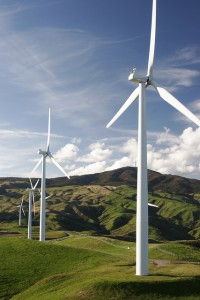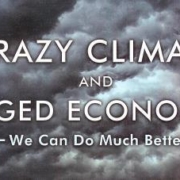Progress Toward a True-Cost Economy Comes from Renewable Energy
by Brent Blackwelder
A renewable energy revolution is sweeping the planet. This revolution has profound implications because it signals that the global economy is moving to stop the growth of our human carbon footprint.
The global economy has run for a century primarily on fossil fuels but is now undergoing a rapid transition to a global economy based significantly on rooftop solar, wind, and efficiency. This is a tangible movement toward a steady state economy because with wind and solar, the amount we use today does not affect tomorrow’s supply; and unlike fossil fuels, the pollution externalities are small and do not harm fellow competitors or the public.
This revolution is more than a technical fix because it is shifting the ingredients of the material products and services of the economy from toxic, polluting, non-renewable substances and ingredients to ones that are renewable and dramatically lower in pollution. It is demonstrating that renewable energy can avoid imposing dangerous impacts onto the public or onto future generations.
Skeptics over the last two decades have argued that renewable sources such as wind and solar are trivial and simply incapable of providing the power needed by the global economy—that all they will ever do is provide only a small percentage of the world’s electricity. I remember the days when utility executives belittled renewables, warning that more than about 5% of wind or solar electricity in a region would crash the grid!

The renewable energy revolution is a stepping stone toward a sustainable true-cost economy. Photo Credit: janie.hernandez55
I want to present a few startling and uplifting facts that demonstrate the dramatic progress recently made by solar and wind power around the world. 1 These facts give the lie to the phony assertions made by utilities in their efforts to block renewable energy.
Rooftop solar is growing worldwide by 50% per year. In 1985 solar cost $12 per watt, but today’s prices are closer to 36 cents per watt. Every five hours the world adds 23 MW of solar—which was the global installed capacity in 1985.
In January of 2014 Denmark got 62% of its electricity from wind. In 2013 Ireland got 17% of its electricity from wind, and Spain and Portugal both exceeded 20% from wind. Today China gets more electricity from wind (91,000 MW) than it does from nuclear reactors. The United States is second in the world in installed wind turbines, with South Dakota and Iowa obtaining over 26% of their electricity from wind.
As we look to achieve a true-cost, steady state economy, questions are constantly raised about the behavior of other powerful nations that might appear to have no interest in a sustainable economy. The renewable energy revolution provides breakthrough opportunities here. China is already putting its energy future into more and more renewable energy. It plans to more than double its current wind capacity with an expansion goal of 200,000 MW by the year 2020.
Even the French, who rely on nuclear reactors for 75% of their electricity, are planning on increasing their wind generating capacity to 25,000 MW from their present 8,300 MW.
The renewable energy revolution will enable civilization to stop the growth of highly polluting fossil fuels. It will enable society to leave the majority of the remaining reserves of fossil fuels alone and unburned. Acceleration of this revolution helps in solving many problems and is a key to restoring and maintaining the life support systems of the earth.
For a number of reasons, this renewable energy revolution is a stepping stone toward a sustainable true-cost economy. First, unlike fossil fuels, the footprint of wind and rooftop solar is minimal. Wind turbines erected on farmland use very little land and allow farming to continue. Rooftop solar can be placed on flat commercial and industrial roofs in metropolitan areas where connections to the grid are available.
In comparison, extraction of fossil fuels can create some of the worst pollution and habitat destruction ever seen. Consider the devastation being caused in the biologically diverse mountain forests of West Virginia by mountaintop removal coal mining. Or look at the obliteration of Alberta’s landscape and contamination of its lakes and rivers from tar sands mining.
This point is substantial because far too many of the products of the global economy involve externalization of enormous pollution costs.
Second, the usage of wind and solar today does not affect the amount of wind and solar available tomorrow. They are renewable. Furthermore, wind and rooftop solar are basically waterless technologies, whereas fossil fuel and nuclear power plants use enormous quantities of water for cooling. As water shortages multiply worldwide as a result of population and industrial growth, and climate disruption, this benefit will become even more significant.
Third, wind and solar are big job creators. In Germany the number of jobs in wind and solar is about 400,000 versus 200,000 in coal and conventional fuels. This amazing boost in clean energy jobs has happened in the last decade. Job creation is a major concern in any transition to a sustainable economy.2
Those who are serious about getting to a true–cost economy should help accelerate the renewable energy revolution as a way to achieve it.
Notes
- See The Great Transition by Lester Brown and colleagues at the Earth Policy Institute for a superb account of the global renewable energy revolution that offers hope to all.
- See Energiewende for the job figures; see also Peter Victor in Tim Jackson’s Prosperity Without Growth for a discussion of transition scenarios and jobs.






What happens in these places when there is no sun and/or too weak or strong wind forces to be useable? Are you suggesting that we can continue maintain even the current state of worldwide industrialization using only or mostly wind and solar for everything including transportation with no fossil fuels or nuclear at all in the mix?
Scott – we are not just talking about individual units – there are places that have plenty of wind and/or sun where larger arrays produce plenty of power that can be transmitted “over the grid” – just as places that have no waterfalls/dams or nuclear plants get power from those sources …
Scott, your question is hugely important for ecological economics and the goal of a steady state economy. The question is also hugely complex without an easy or available answer. Here is a nice summary of the complexity of your question, which points to “optimal scale or maximum sustainable scale,” from an article by Brian Cezch. (https://steadystate.org/wp-content/uploads/Czech_Ecological_Economics.pdf)
“Maximum sustainable scale, then, cannot be estimated without an understanding of: 1) the natural resource stocks and ecological services provided by nature, collectively referred to as
“natural capital;” 2) how natural capital stocks and services are converted or used up in the
process of economic growth; 3) to what extent natural capital is substitutable by human
technology, and; 4) the prospects for human technology to progress in a manner and at a rate
sufficient for finding, and putting into production, substitutes for natural capital. All four of these
topics are highly complex, and ecological economists do not presume that humans will develop a
thorough and accurate synthesis, espousing instead the “precautionary principle” in
environmental and economic management.”
– Brent,
There is a surprising optimism all through your article; ‘A renewable energy revolution is sweeping the planet.’!
Let us hope that is so and that Exxon is among your readers; not only the world’s investors and economists. Spending a day somewhere in urban America watching the traffic (realizing that we could watch from tens of thousands of other places both there and in numerous other countries), the vision of it all being driven by renewables seems indeed to call for a revolution. ‘Carmageddon’ – certain to follow the exponential increase in cars (‘overcarpolation’) – need to arrive soon and is not welcome by oil companies and others addicted to humanity’s daily dose of fossil calories.
Your deep concern is much appreciated.
– Ragnar.
ps.: During the last century it has been impossible for sound minds to think of a single reason to add more people to those already onboard spaceship Earth, but that has not produced many sound minds. During this period renewable energies has equally been called on by sound minds and I – for one – entropically hope that the revolution you are seeing is real – as well as a few others! Ethical, ecological and economic paradigm shifts are sorely needed. R.